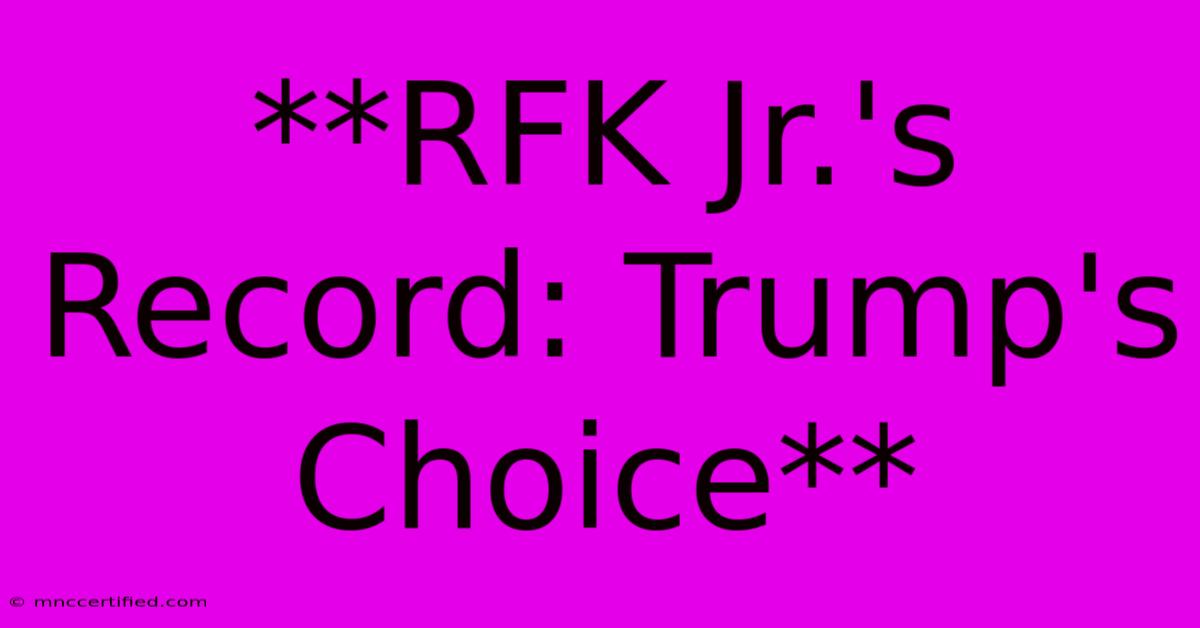**RFK Jr.'s Record: Trump's Choice**

Table of Contents
RFK Jr.'s Record: Trump's Choice for President
Robert F. Kennedy Jr., the son of the slain senator and brother of former president John F. Kennedy, has announced his candidacy for the 2024 Democratic presidential election. This decision has sparked widespread debate, particularly given his past controversies and outspoken views.
A Legacy of Activism and Controversy
RFK Jr. is a renowned environmental lawyer and activist, known for his work on issues like mercury pollution and vaccine safety. He is the founder of Children's Health Defense, an organization advocating for vaccine safety and challenging the mainstream narrative on their effectiveness.
However, RFK Jr.'s stance on vaccines has drawn significant criticism, with many accusing him of spreading misinformation and contributing to the anti-vaccine movement. He has been accused of promoting conspiracy theories and making scientifically unfounded claims about vaccines.
A Controversial Figure: Beyond Vaccines
RFK Jr.'s controversies extend beyond vaccines. His outspoken views on other issues like climate change and government overreach have also sparked heated debates. He has been accused of using his family's legacy to gain attention for his views, which are often perceived as fringe or radical.
Why Trump?
RFK Jr.'s candidacy is considered a significant development in the 2024 election. His decision to run against his own party's incumbent, President Biden, is seen as a challenge to the Democratic establishment and a potential sign of a growing rift within the party.
While some argue that RFK Jr.'s candidacy is a long shot, his decision to run reflects the polarized state of American politics. His campaign is likely to focus on issues that resonate with voters on the political fringes, particularly those dissatisfied with the current state of affairs.
The Impact of RFK Jr.'s Candidacy
RFK Jr.'s candidacy has the potential to disrupt the 2024 election in several ways. He could draw support from voters disillusioned with both parties, potentially impacting the outcome of the race. His campaign could also generate significant media attention, further polarizing the political landscape.
Ultimately, the impact of RFK Jr.'s candidacy will depend on his ability to garner support and effectively communicate his message to a broader audience. His past controversies and outspoken views may prove to be both an asset and a liability, influencing the trajectory of his campaign.
Conclusion
RFK Jr.'s decision to run for president has shaken up the 2024 political landscape. Whether his candidacy is successful or not, it underscores the deep divisions within the Democratic Party and the evolving nature of American politics. As the campaign progresses, it will be crucial to scrutinize RFK Jr.'s positions and evaluate his potential impact on the political discourse.

Thank you for visiting our website wich cover about **RFK Jr.'s Record: Trump's Choice**. We hope the information provided has been useful to you. Feel free to contact us if you have any questions or need further assistance. See you next time and dont miss to bookmark.
Featured Posts
-
Cynthia Erivo On Wicked Ballroom Dance
Nov 15, 2024
-
Siya Kolisi Leads South Africa Against England
Nov 15, 2024
-
Live England Defeats Greece Match Report
Nov 15, 2024
-
Bluesky Downtime Is It Happening Now
Nov 15, 2024
-
Velodrome Finance Price Prediction
Nov 15, 2024